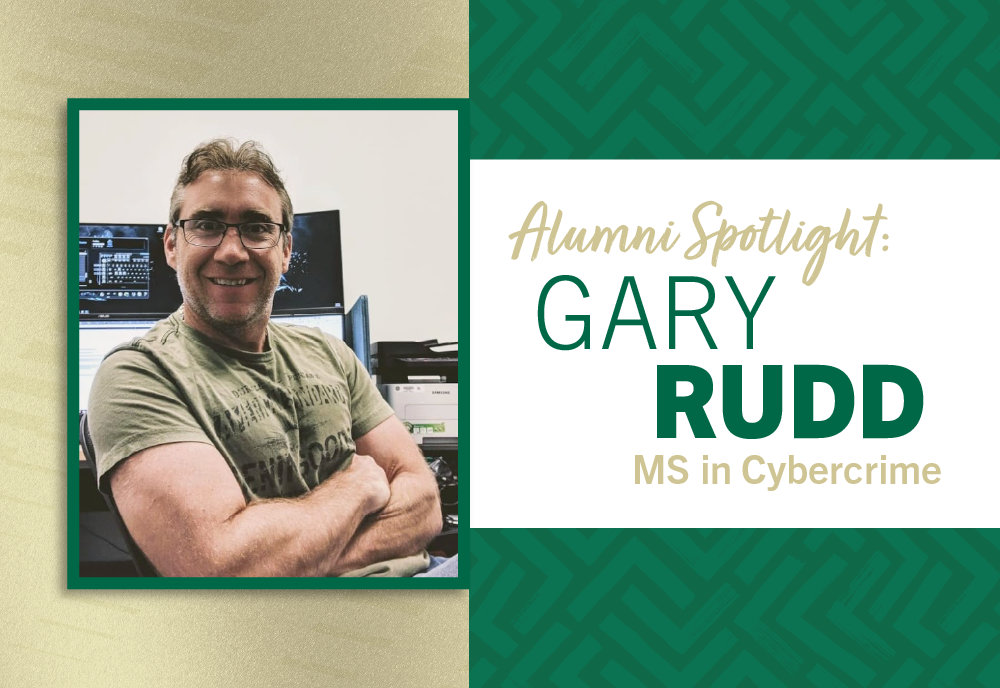[ad_1]
As cybercriminals develop more sophisticated tactics, investigators like Gary Rudd
must stay ahead of the latest digital threats. With nearly two decades of experience
as a special agent in the U.S. Department of Defense, Rudd has spent his career tracking
down cybercriminals and protecting digital assets. But even with years in the field,
he saw the value of continuous learning. Though Rudd’s career is rooted in cyber investigations,
he originally pursued a different path. After earning a degree in aeronautical science,
he became a pilot. But his interest in technology led him to launch his own computer
company while still in college, an experience that set the foundation for his future
in federal cybercrime investigation.
“I’ve always been fascinated with computers and the internet,” Rudd said. “I gained
an extensive background in computer security networks while running my company.”
JOINING THE FEDERAL GOVERNMENT
With years of entrepreneurial experience in computer security, Rudd transitioned into
working for the federal government in 2008, joining the DoD as a special agent. Since
then, he has been at the forefront of cyber investigations. He works at the U.S. Department
of Defense, Defense Criminal Investigative Service, Cybercrime Field Office, spearheading
complex investigations and tracking down cybercriminals.
“Wherever we go, it’s for investigations, to execute search warrants, or make arrests,”
he said.
Though based in South Florida, his work frequently takes him around the country –
and the globe. When he’s not traveling, he operates out of the DoD’s Fort Lauderdale
field office, where he combats cyber threats.
CHOOSING USF
Soon after joining the DoD, Rudd met Thomas Hyslip, a fellow agent at the department,
who then became his supervisor for a decade. Hyslip, now an assistant professor of
instruction in USF’s MS in Cybercrime, recommended that Rudd check out the online
degree program.
Rudd did his research and quickly saw that USF was the right fit. The program was
affordable, aligned with his work schedule, and came highly recommended by a colleague
he trusted. “With the education stipends offered by the DoD, plus the cybercrime program’s
affordability, choosing USF to advance my education was a no-brainer,” he said.
For Rudd, USF stood out for its balance of quality and flexibility. As a busy working
professional, he needed a program that fit his schedule without sacrificing academic
rigor. The expertise of USF’s faculty – who bring real-world experience and academic
knowledge – made the decision even easier, giving him confidence that he was gaining
practical, hands-on skills.
EXPERIENCE IN THE PROGRAM
He said that since most of his classmates were also deep into their careers, faculty
recognized the importance of work-life balance.
Thanks to its small class sizes, averaging about 12 students, the program fostered
meaningful connections between instructors and peers, many of whom were also experienced
professionals. With a blend of self-paced assignments and collaborative work, such
as discussion boards, the learning environment achieved a crucial balance, Rudd said.
Rudd said that one of the standout courses was the Public Policy and Cybercrime class
with Assistant Professor of Instruction Thomas Hyslip, which covered case law and
the history of cybercrime.
“This class explored cybercrime laws, how they have evolved, and how to apply them
in investigations and policy,” said Rudd. “We also examined digital criminalization,
differences between civil and criminal investigations, and probable cause in cybercrime
warrants – knowledge that is highly valuable in my field.”
Taking two to three classes per semester, Rudd was able to complete the program in
just 18 months.
REAL-WORLD IMPACT: GAINING NEW TOOLS FOR CYBER INVESTIGATIONS
Despite his extensive background, Rudd walked away from the program with new skills
he could immediately apply to his job. “Digital evidence collection is something I
do regularly as a federal agent,” he said. “The digital evidence collection class
helped me learn new ways to document and track evidence I’d never seen before.”
Beyond sharpening his technical skills, Rudd also developed a deeper understanding
of the legal and administrative side of cybercrime, broadening his perspective on
the field.
WORDS OF ADVICE
Reflecting on his experience, Rudd emphasized that cybercrime is a field with endless
opportunities.
“You can go into administrative policy, cyber protection, or consulting if the technical
side isn’t your thing,” he said.
Whether you’re an experienced investigator like Rudd or looking to transition into
the field, USF’s MS in Cybercrime provides the skills needed to thrive in this rapidly
growing industry. Visit the website to discover how this program can help you advance your career.
[ad_2]
Source link
Click Here For The Original Source.

